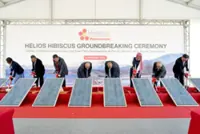STOCKHOLM: A former Gunvor Group trader is rushing to expand battery capacity in southern Sweden, one of the regions in Europe most at risk of winter power shortages.
The uptake is increasing rapidly because batteries can store electricity when wind and solar generation is high and supply it to the grid when production is low.





